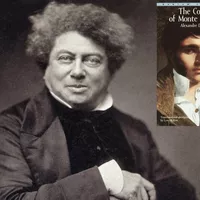Chapter 15. Number 34 and Number 27 (5)
Was he to be thus stopped at the beginning, and was he to wait inactive until his fellow workman had completed his task? Suddenly an idea occurred to him--he smiled, and the perspiration dried on his forehead.
The jailer always brought Dantes' soup in an iron saucepan; this saucepan contained soup for both prisoners, for Dantes had noticed that it was either quite full, or half empty, according as the turnkey gave it to him or to his companion first. The handle of this saucepan was of iron; Dantes would have given ten years of his life in exchange for it.
The jailer was accustomed to pour the contents of the saucepan into Dantes' plate, and Dantes, after eating his soup with a wooden spoon, washed the plate, which thus served for every day. Now when evening came Dantes put his plate on the ground near the door; the jailer, as he entered, stepped on it and broke it.
This time he could not blame Dantes. He was wrong to leave it there, but the jailer was wrong not to have looked before him.
The jailer, therefore, only grumbled. Then he looked about for something to pour the soup into; Dantes' entire dinner service consisted of one plate--there was no alternative. "Leave the saucepan," said Dantes; "you can take it away when you bring me my breakfast." This advice was to the jailer's taste, as it spared him the necessity of making another trip. He left the saucepan.
Dantes was beside himself with joy. He rapidly devoured his food, and after waiting an hour, lest the jailer should change his mind and return, he removed his bed, took the handle of the saucepan, inserted the point between the hewn stone and rough stones of the wall, and employed it as a lever. A slight oscillation showed Dantes that all went well. At the end of an hour the stone was extricated from the wall, leaving a cavity a foot and a half in diameter.
Dantes carefully collected the plaster, carried it into the corner of his cell, and covered it with earth. Then, wishing to make the best use of his time while he had the means of labor, he continued to work without ceasing. At the dawn of day he replaced the stone, pushed his bed against the wall, and lay down. The breakfast consisted of a piece of bread; the jailer entered and placed the bread on the table.
"Well, don't you intend to bring me another plate?" said Dantes.
"No," replied the turnkey; "you destroy everything. First you break your jug, then you make me break your plate; if all the prisoners followed your example, the government would be ruined. I shall leave you the saucepan, and pour your soup into that. So for the future I hope you will not be so destructive." Dantes raised his eyes to heaven and clasped his hands beneath the coverlet. He felt more gratitude for the possession of this piece of iron than he had ever felt for anything. He had noticed, however, that the prisoner on the other side had ceased to labor; no matter, this was a greater reason for proceeding--if his neighbor would not come to him, he would go to his neighbor. All day he toiled on untiringly, and by the evening he had succeeded in extracting ten handfuls of plaster and fragments of stone. When the hour for his jailer's visit arrived, Dantes straightened the handle of the saucepan as well as he could, and placed it in its accustomed place. The turnkey poured his ration of soup into it, together with the fish--for thrice a week the prisoners were deprived of meat. This would have been a method of reckoning time, had not Dantes long ceased to do so. Having poured out the soup, the turnkey retired. Dantes wished to ascertain whether his neighbor had really ceased to work. He listened--all was silent, as it had been for the last three days. Dantes sighed; it was evident that his neighbor distrusted him. However, he toiled on all the night without being discouraged; but after two or three hours he encountered an obstacle. The iron made no impression, but met with a smooth surface; Dantes touched it, and found that it was a beam. This beam crossed, or rather blocked up, the hole Dantes had made; it was necessary, therefore, to dig above or under it. The unhappy young man had not thought of this. "O my God, my God!" murmured he, "I have so earnestly prayed to you, that I hoped my prayers had been heard. After having deprived me of my liberty, after having deprived me of death, after having recalled me to existence, my God, have pity on me, and do not let me die in despair!" "Who talks of God and despair at the same time?" said a voice that seemed to come from beneath the earth, and, deadened by the distance, sounded hollow and sepulchral in the young man's ears. Edmond's hair stood on end, and he rose to his knees. "Ah," said he, "I hear a human voice." Edmond had not heard any one speak save his jailer for four or five years; and a jailer is no man to a prisoner--he is a living door, a barrier of flesh and blood adding strength to restraints of oak and iron.
"In the name of heaven," cried Dantes, "speak again, though the sound of your voice terrifies me. Who are you?"

